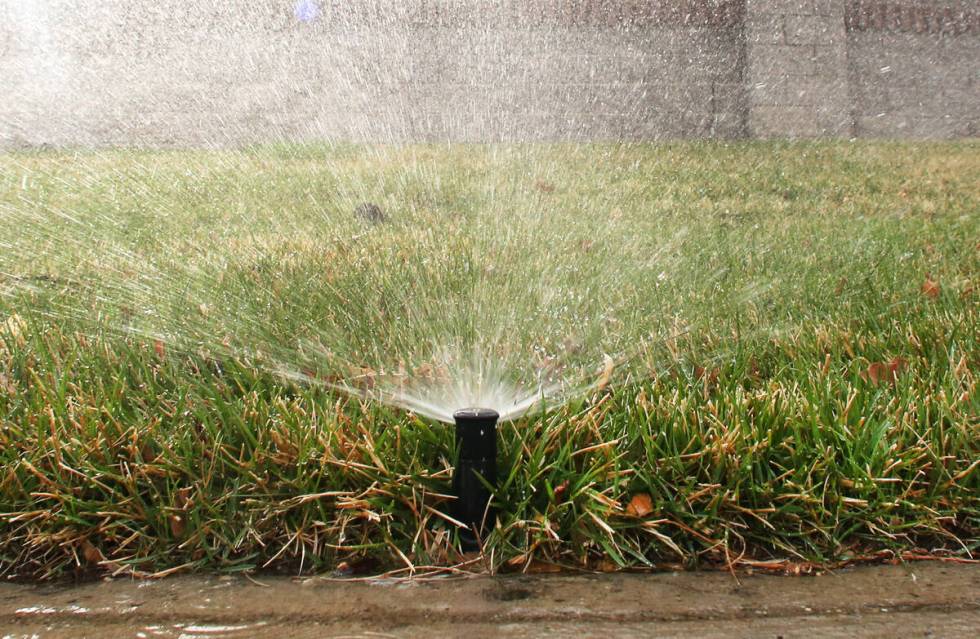As reservoirs shrink, here are 5 ways to conserve water in Southern Nevada

While the Southwest is experiencing the worst prolonged drought in recorded history, Las Vegas continues to find new ways to reduce its water footprint, which is already considerably smaller than that of other desert cities.
About 40 million people rely on the declining Colorado River for basic water needs like showering, drinking and irrigating their lawns. Nevada, which is allowed to use the smallest amount of water of any state by far, recycles almost all water used indoors in the Las Vegas Valley, returning it back to Lake Mead.
The Southern Nevada Water Authority has made considerable strides over the past two decades with an ultimate goal of reducing the number of gallons of water per person per day to 86. In 2023, that number was 89 — the lowest it’s ever been.
That mission is not without criticism, though, among groups like the Water Fairness Coalition that contend placing such a responsibility on individual action is an overreach and that some solutions may have unintended consequences.
Whether you’re brand new to the region or Battle Born to the core, here are five water conservation strategies that residents of Southern Nevada should consider to do their part in fighting drought in the Colorado River basin.
Rip out your thirsty grass
The largest use of water by far has long been homes and apartments.
And because nearly every drop of water used indoors — including human waste — is recycled and sent to Lake Mead, the use of outdoor water that cannot be recycled becomes a major target. Then comes into focus the thirsty grass in Las Vegas lawns.
The water authority’s Water Smart Landscape Rebate Program allows for much of the grass removal across the valley in homes to be nearly free, with a financial incentive to get water use down. There’s a list of approved water-smart landscapers that the agency recommends to get the work done.
The program’s details can be found at www.snwa.com/rebates/wsl/.
Follow watering calendars to a T
On the subject of lawns, there’s a reason it’s illegal to water outside of approved times. The water authority’s allowed schedule changes four times a year depending on the season.
The strictest schedules come in winter, when watering is only allowed on one assigned day of the week. In the summer, watering is relegated to the nighttime to ensure that unnecessary water isn’t lost to the heat.
Watering yards on Sunday is always prohibited no matter the season, according to the water authority.
To find their watering group, Southern Nevadans can go to www.snwa.com/conservation/watering-group.
Conduct your own water use audit
The water authority can help homeowners realize where their blindspots are when it comes to water use, too.
By conducting what the agency calls a water use audit, homeowners can deduce whether they’re watering their lawn appropriately or if they may have a leak.
Customers can request a home kit on the water authority website or by calling the water conservation hotline at 702-258-SAVE. The agency also offers free classes at Springs Preserve to learn how to do this correctly.
Report water waste violations
In a drought, when you see something, it’s best to say something.
Letting water run out into the street and go to waste can be a costly offense, with fines up to $5,000 for repeat offenders, according to the Southern Nevada Water Authority, with variations based on city and county ordinances.
The best way to report water waste in Southern Nevada is at www.snwa.com/conservation/water-waste/, where there are specific forms for each city.
Tap into sewer systems
There are about 7,000 water authority customers that remain with siloed septic systems that don’t allow for water used indoors to be recycled through one of the region’s wastewater treatment facilities.
According to the agency, that equates to 619 million gallons of water that is lost every year.
Though converting homes to sewer can be expensive, the water authority has a pot of money that will either partially or entirely cover the cost.
For more information on rebate programs for septic to sewer conversion, go to www.snwa.com/rebates/septic-conversion/.
Contact Alan Halaly at ahalaly@reviewjournal.com. Follow @AlanHalaly on X.